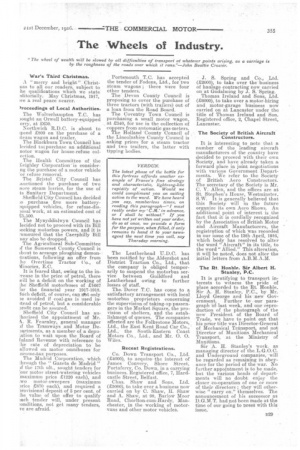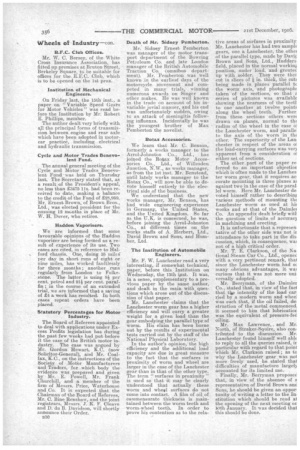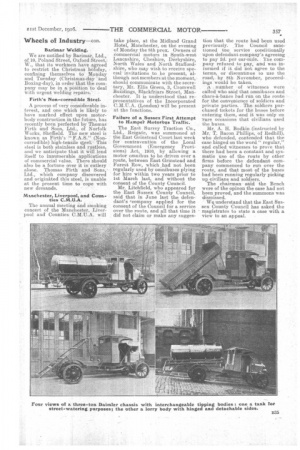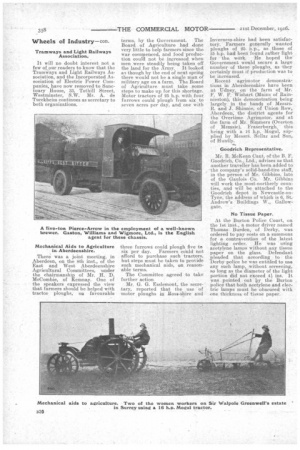The Wheels of Industry.
Page 7

Page 8

Page 9

Page 10

If you've noticed an error in this article please click here to report it so we can fix it.
"The wheel of wealth will be slowed by all difficulties of transport at whatever points arising, as a carriage is by the roughness of the roads over which it runs."—John Beattie Crozidr.
War's Third Christmas.
A "merry and bright" Christnas -to all our readers, subject to he qualifications which we state 3ditorially. May Christmas, 1917, :ee a real peace nearer.
)roceedings of Local Authorities.
The Wolverhampton T.C. has iought an Orwell battery-equipped errs., at £630.
N'orthwich R,D.C. is about to ;pond £800 on the purchase of a ;team wagon and trailer.
The Blackburn Town Council has lecided to purchase an additional notor wagon for house-refuse colection.
The Health Committee of the Keighley Corporation-is considerng the purchase of a motor vehicle 'or refuse removal.
The Bristol City Council has auctioned the purchase of two core steam lorries, for the use of ts Sanitary Department. Sheffield City Council has decided o purchase five more battery:quipped vehicles, for refuse-dislosal work, at an estimated cost of C5,500.
The Mynyddislwyn Council has lecided not to proceed with its Bill ieeking motorbus powers, and it is !umoured that the Caerphilly Bill nay also be dropped. The Agricultural Sub-Committee if the Somerset County Council is Lbout to arrange ploughing demonitrations, following an offer from he Overtime Tractor Co., of Wineries, E.C.
It is feared that, owing to the in!rease in the price of petrol, there will be a deficit on the working of he" Sheffield .motorbuses of £1667 .for the financial year 1917-1918. 3tich deficit, of course, can IBA only Pe avoided if coal-gas is used in;tend of petrol, but a considerable Profit can be assured. •
Sheffield City Council has auhorized the appointment of Mr. A.. R. Fearnley, general manager if the Tramways and Motor Departments, as a. member of a depuAtion to wait upon the Board of Inland Revenue with reference to he rate of depreciation to be allowed on motor omnibuses for neome-tax purposes. The Madrid Corporation, which :hrough the " Gazeta de Madrid" if the 17th ult., sought tenders for our motor street-watering vehicles maximum price 21220 each), and ,wo motor-sweepers (maximum price 2870 each), and required a provisional deposit of 5 per cent. of ;he value of the offer to qualify :ach tender will, under present ortditions, not get many tenders, ve are afraid. Portsmouth T.C. has accepted the tender of Fodens, Ltd., for two steam wagons ; there were four other tenders.
The Devon County Council is proposing to cover the purchase of three tractors (with trailers) out of a loan from the Road Board.
The Coventry Town Council is purchasing a small motor wagon, at 2340, for use in the collection of coppers from automatic gas-meters.
The Holland County Council of the Lincolnshire County Council is asking prices for a steam tractor and two trailers, the latter with tipping bodies.
The Leatherhead U.D.. has been notified by the Aldershot and District Traction Co., Ltd., that the company is obliged temporarily to suspend the motorbus service between Guildford and Leatherhead owing to further losses of staff.
The. Dover T.C. has come to a satisfactory arrangement with local motorbus proprietors concerning the supervision of taking-up passengers in the Market Square, the provision of shelters, and the establishment of queues. The companies affected are the Folkestone Motors, Ltd., the East Kent Road Car Co., Ltd., the South-Eastern Coast Motors Co., Ltd., and Mr. 0. 0. Wiles.
Recent Registrations.
Co. Down Transport Co., Ltd. (24000), to acquirethe interest of James Converv, Shore Street, Portaferry, Co. town, in a carrying business. Registered office, 7, Hardcastle Street, Belfast.
Chas. Shaw and Sons. Ltd. (25000), to take over a business now carried on by C. Shaw, H. Shaw and A. Shaw, at 98, Barlow Moor Road, Chorlton-cum-Hardy. Manchester, in the working of motorvans and other motor vehicles.
J. S. Spring and Co., Ltd. (22000), to take over the'business of haulage contracting now carried on at Godalrning by J. S. 'Spring.
Thomas Ireland and Sons, Ltd. (26000), to take over a motor-hiring and motor-garage business now carried on at Lancaster under the title of Thomas Ireland and Son. Registered office, 2, Chapel Street, Lancaster.
The Society of British Aircraft Constructors.
It is interesting to note that a number of the leading aircraft manufacturers of the country have decided to proceed with their own Society, and have already taken a forward place in joint negotiations with various Government Departments. We refer to the Society of British Aero Constructors. The secretary of the Society is Mr. C. V. Allen, and the offices are at St. Stephen's House, Westminster. S.W. It is generally believed that this Society will in the future organize its own Aero Shows. An additional point of interest is the fact that it is cordially recognized by the Association of British Motor and Aircraft Manufacturers, the registration of which was recorded in our issue of the 13th April, 1916, which body has resolved to alter theword "Aircraft" in its title to the word "Allied," This alteration, it will be noted, does not alter the initial letters from A.B.M.A.M.
The Rt. Honble. Sir Albert H. Stanley, P.C.
It is gratifying to transport interests to witness the pride of place accorded to the Rt. Honble. Sir A. H. Stanley, P.C., by Mr. Lloyd George and his new Government. Further to our . parsgraph oflast week, and our reproduction of the photograph of the new President of the Board of Trade, we have to point out that his prior title was Director-General of Mechanical Transport, and not Director of Munitions Mechanical Transport, at the Ministry of Munitions.
Sir A. H. Stanley's work, as managing director of the L.G.O.C. and Underground companies, will be regarded as remaining in abeyance for the period of the war. No further appointment is-to be made, but the various heads of departments will no doubt enjoy the closer co-operation of one or more of their directors ; they will otherwise "carry on." themselves. The announcement of his successor as D.G.M.T. had not been made at the time of our going to press with this issue.
R.F.C. Club Offices.
Mr. W. C. Bersey, of the White Cross Insurance Association, has fitted :up premises at Bruton Street, Berkeley Square, to be suitable for offices for the 11.F. 0. Club, which is to he opened on the 1st proxl Institution of Mechanical Engineers.
On Friday last, the 15th inst., a paper on Variable Speed Gears for Motor Vehicles" was read before the Institution by Mr. Robert E. Phillips, member.
The author dealt very briefly with Ail the principal forms of transmission between engine and rear axle which have been adopted in motorcar practice, including electrical and hydraulic transmission.
Cycle and Motor Trades Benevolent Fund.
The annual general meeting of the Cycle and Motor Trades Benevolent Fund was held on Thursday last. The Secretary stated that, as a result of the President's appeal, no less than £3475 11s. had been received to date, making a balance to the credit of the Fund of 228,959. Mr. Ernest Brown, of Brown Bros., Ltd., was elected president for the ensuing 12 months in place of Mr. W. H. Dover, who retires.
Haddon Vaporisers.
We are informed that some favourable opinions of the Haddon vaporizer are being formed as a result of experience of its use. Two cases are cited, in reference to Hal , ford chasSis. One, doing 35 miles per day in short runs of eight or nine miles, has worked faultlessly for three months ; another runs regularly from London to Folkestone. The latter is using 84 per cent, petrol and 914 per cent. paraffin; in the course of an extended trial, we are iilformed that a saving of 24 a week has resulted. In both cases repeat orders have been placed.
Statutory Percentages for Motor Industry.
The Board of Referees appointed to deal with applications under Excess Profits legislation has during the past few weeks had put before it the case of the British motor industry. The ease was argued by Mr. Gordon Hewart, K.C. (now Solicitor-General), and Mr. Coalfax, LO., on the instructions of the society of Motor Manufacturers and Traders,for which body the evidence was prepared and given by Mr. E. Powell, Mr. Frank Churchill, and a member of the firm of Messrs. Price, Waterhouse and Co. It is expected that the Chairman of the Board of Referees, Mr. C. Bine Renshaw, and the joint registrars, Messrs: J. K. F. Cleave and D. du B. Davidson, will shortly announce their Order.
n30 Death of Mr. Sidney Pemberton.
Mr. Sidney Ernest Pemberton was manager of the motor transport department of the Bowring Petyoleurn Co. and late London manager of the British Automobile Traction Co. (omnibus department). Mr. Pemberton was well known in the earliest days of the motorcycle movement and competed in many trials, winning numerous awards on Singer and other makes. He was well known in .the trade on account of his invariable jovial manner, and his end was unfbrtunately sudden, owing to an attack of meningitis following influenza. Incidentally be was the youngest brother of Max Pemberton the novelist.
Rotax Accessories.
We learn that Mr. C. Benson, formerly a works manager to the Arrol-Johnston Ltd. has
joined the RotAx Co., '
Motor Acces
sories Co., Ltd., of Willesden Junction, NW., as works manager, as from the 1st inst. Mr. Benstead, until lately works manager to the Rotax Co., will now be able to devote himself entirely to the electrical side of the business.
We understand that the new works manager, Mr. Benson, has had wide engineering experience in Germany, the United States, and the United Kingdom. So far as the U.K. is concerned, he was, before joining the Arrol-Johnston Co. at different times on the works staffs of A. Herbert., Ltd., David Brown and Sons, and Humber, Ltd.
The Institution a Automobile Engineers.
Mr. F. W. Lanchester read a very interesting, if somewhat technical, paper, before this Institution on Wednesday, the lath i,nst. It was, in a sense, supplementary to a previous paper by the same author, and dealt in the main with questions which arose out of the discussion of that paper.
Mr. Lanchester claims that the Lanthester worm gear has a higher efficiency and will carry a. greater weight for a given load than the gear embodying the parallel type of worm. His claim has been borne out by the results of experimental tests carried out by the staff of the National Physical Laboratory.
In the author's opinion, the high efficiency and the additional load capacity are due in great measure to the fact that the surfaces in proximity of worm and wheel are larger in the case of the Lanchester gear than in that of the other type. The term " surfaces in proximity" is used so that it may be clearly understood that actually these worm and wheel surfaces do not come into contact. A film of oil of commensurate thickness is maintained between the worm teeth and worm-wheel teeth. In order to prove his contention as to the rela tive areas of surfaces in proximity. Mr. Lanchester has had two samph gears, one a Lanchester, the othei of the parallel type, made by Davie Brown and Sons, Ltd., Hudders field, placed in the normal working position, under load, and groutee up with solder.. They were ther cut in slices of in. thick, the cuts being made in planes parallel tc the worm axis, and photograph! taken of the sections, so that E series of pictures was available showing the nearness of the teed to one another at twelve points along the wheel teeth. Further, from these sections others werE drawn on planes, normal to ths radius of the wheel in the ease a] the Lanchester worm, and paralle to the axis of the worm in the other. The superiority of the Lan chester in respect of the areas oi the load-carrying surfaces was verj apparent from a consideration a] either set of sections.
The other part of the paver re ferred to an important objection which is often made to the Lan ches ter worm gear, that it requires ac curate mounting in three planes a! against two in the case of the paral lel worm. Here Mr. Lanchester de voted himself rather to describing various methods of mounting thE Lanchester worm as used at hi! works and at that of the Daimlei Co. An appendix dealt briefly witl the question of limits of accuracj in machining and erecting. It is unfortunate that a represen tative of the other side was not ir attendance to take part in the dis cussion, which, in consequence, wm not of a high critical order.
Mr. T. E. Clarkson, of the Na. tional Steam Car Co., Ltd., openec with a very pertinent remark, that since the Lanchester worm had sc many obvious advantages, it was curious that it was not more uni versally adopted.
Mr. Berryman, of the Daimler Co., 'stated that, in view of the faci that tile intensity of the load car ried by a modern worm and wheel was such that, if the oil failed, dc. struction of the metal commenced, it seemed to him that lubrication was the equivalent of pressure-fed oiling, Mr. Max Lawrence, and Mr. North, of Straker-Squire, also contributed to the discussion. Mr. Lanchester found himself well able to reply to all the queries raised, if particular with regard to that poini which Mr. Clarkson raised ; as to why the Lanchester gear was noi more freely used, he stated thai difficulties of manufacture largely accounted ler its limited use.
Finally, Mr. Berryman proposed that, in view of the absence of a representative, of David Brown and Sons, he should be given an °ppor. tunity of writing a letter to the Institution which should be read ai the opening of the next meeting or lEOth January. It was decided thai this should be done. Barimar Welding.
We are notified by Ba.rimar, Ltd., of 10, Poland Street, Oxford Street, W., that its workmen have agreed to restrict the Christmas holiday, confining themselves to Monday and Tuesday (Christmas-day and Boxing-day), in order that the company may be in a position to deal with urgent welding repairs.'
Firth's Non-corrodible Steel.
A process of very considerable interest, and one which is likely to have marked effect upon motorbody construction in the future, has recently been perfected by Thomas Firth and Sons, Ltd., of Norfolk Works, Sheffield. The new steel is known as Firth's " F.A.S." (Non corrodible) high-tensile steel. This steel is both stainless and rustless, and we anticipate that it will lend itself to innumerable applications of commercial value. There should also be a fortune over it in cutlery alone. Thomas Firth and Sons,. Ltd., which company discovered and originated this steel, is unable at the present time to cope with new demands.
Manchester, Liverpool, and Counties C.M.U.A: The annual meeting and smoking concert of the Manchester, Liverpool and Counties C.M.U.A. will take place, at the Midland Grand Hotel, Manchester, on the evening of Monday the 8th prox. Owners of .commercial motgrs in South-west Lancashire, Cheshire, Derbyshire, North Wales and North Staffordshire, who may wish to receive special invitations to be present, although. not members at the moment, • should communicate with the secretary, Mr. Ellis Green, 3, Cromwell Buildings, Blackfriars Street, Manchester. It is understood that representatives of the Incorporated C.M.U.A. (London) will be present at the functions.
Failure of a Sussex First Attempt to Nampa. Motorbus Traffic.
The East Surrey Traction Co., Ltd., Reigate, was summoned at the East Grinstead Court last week for contravention of the Local Government (Emergency Provisions) Act, 1916, by allowing a motor omnibus to be driven over a route, between East Grinstead and Forest Row, which had not been regularly used by omnibuses plying for hire within two years prior to 1st March last, and without the consent of the County Council.
Mr. Litchfield, who appeared for the East Sussex County Council, said that in June last the defendant's 'company applied for the consent of the Council for a service over the mute, and all that time it did not claim or make any sugges
tion that the route had been used previously. The Council sanctioned tne service conditionally upon defendant company's agreeing to pay 2d. per car-mile. The company refused to pay, and was informed if it did not agree to the terms, or discontinue to use the road, by 8th November, proceedings would be taken.
A . number of witnesses were called who said that omnibuses and chars-k-bancs had run on the route for the convenience of soldiers and private parties.. The soldiers purchased tickets for the buses before entering them, and it was only on rare occasions that civilians used the buses.
Mr. A. H. Bodkin (instructed by Mr. T. Bacon Phillips, of Redhill), who defended, contended that the case hinged on the word" regular," and called witnesses to prove that there had been a constant and sysmatie use of the route by other firms before the defendant company commenced to run over the route, and that most of the buses had been running regularly picking up civilians and soldiers. The chairman said the Bench were of the opinion the case had not been proved, and the summons was dismissed.
We understand that the East Sussex County Council has asked the magistrates to state a case with a view to an appeal. Tramways and Light Railways Association.
It will no doubt interest not a few of our readers to know that the Tramways and Light Railways Association, and the Incorporated Association of Electric Power Companies, have now removed to Sanctuary House, 33, Tothill Street, Westminster, S.W. Mr. A. de Turckheim continues as secretary to both organizations.
Mechanical Aids to Agriculture in Aberdeenshire.
There was a joint meeting, in Aberdeen, on the 8th inst., of the East and West Aberdeenshire Agricultural Committees, under the chairmanship of Mr. IL D. McCombie, of Kernnay. One of the speakers expressed the view that farmers should be helped with tractor ploughs, ou favourable terms, by the Government. The Board of _Agriculture had done very little to help farmers since the war commenced, and food production could not be ingreased when men were steadily being taken off the land for the Army. It looked as though by the end of next spring there would not be a single man of military age on a farm. The Board of Agriculture must take some steps to make up for this shortage. Motor tractors of 25 h.p. with four furrows could plough from six to seven acres per day, and one with three furrows could plough five te six per day. Farmers could not afford to purchase such tractors, but steps must be taken to provide such mechanical aids, on reasonable terms.
The Committee agreed to take further action.
Mr. G. G. Esslemont, the secretary, reported that the use of motor ploughs in Ross-shire and Inverness-shire had been satisfactory. 'Farmers generally wanted ploughs of 25. as those of 15 h.p. had been found rather light for the work. He hoped the Government would secure a large number of these ploughs, as they certainly must if production was to be increased. .
Recent agrimotor demonstrations in Aberdeenshire have been at Udney, on the farm of Mr: F. W. F. Wishart (Mains of Rain-. nieston), this demonstration being largely in the hands of Messrs. R. and J. Shinnie, of Union Row, Aberdeen; the district agents for the Overtime Agrimotor and at the farm of Mr. ;Simmers (Overton of Memsie), Praierburgh, this being with a 16 h.p. Mogul, supplied by Messr.S. Scllar and Son, of Huntly.
Goodrich Representative.
Mr. R.. McKean Cant, of the B. F. Goodrich, Co., Ltd., advises us that another traveller has been added to the company's solid-band-tire staff, in the person of Mr. Gibbins, late of the Ganlois . Co. Mr. Gibbins will work the most-northerly counties, and -will be attached to the Goodrich depot in Newcastle-onTyne, the address of -which is 6, St.Andrew's Buildings W., Gallowgate, No Tissue Paper; At the Burton Police Court, •on the 1st inst., a motor driver named Thomas Burden, of Derby, was ordered to pay costs on a summons for a contravention of the latest lighting order. He was using acetylene lamps without any tissue paper on the glass. Defendant pleaded that according to the Derby police he was entitled to use any such lamp, without screening, so long as the diameter of the light portion did not exceed 41 ins. It was pointed out by the Burton police that both acetylene and electric lamps must be obscured with one thickness of tissue paper.






















